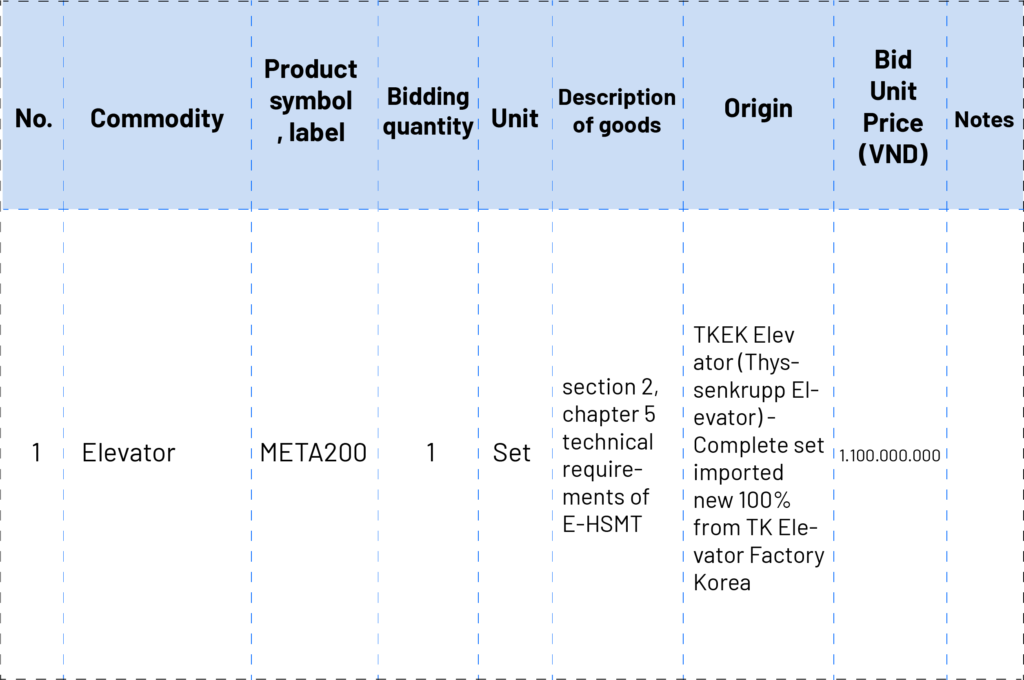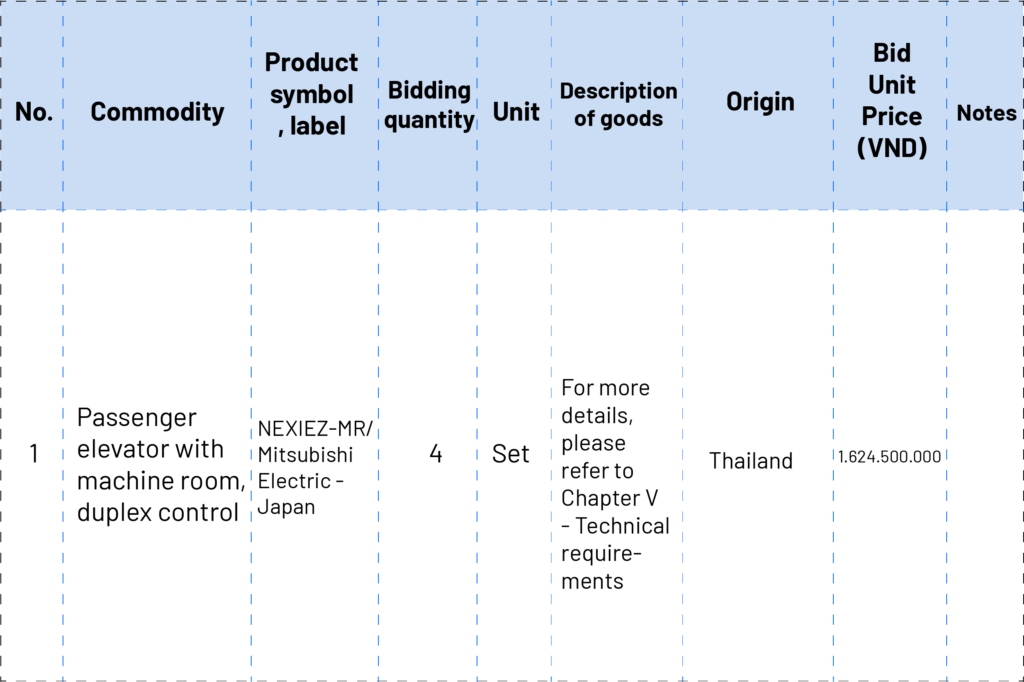EM – The statistics on the winning documents of public investment projects have shown that most of the imported elevator won. Elevators manufactured in the country are almost “out of league”. What is the reason for this problem?
Lose at home
The Project Management Board (PMU) of Bien Hoa city, Dong Nai province issued a decision approving the bidding documents (HSMT) No. 373 on May 21st, 2021. The main content is that the bid will be organized for Package 4 – Elevator equipment for the Service Center, public administration with the number of 4 elevators. Public bidding form nationwide and online contractor selection.
TL, a well-known enterprise in the elevator industry has won the bid with the product code NEXIEZ-MR/Mitsubishi Electric – Japan.

The dossier with code 20210956417-00 belonging to the project to renovate and expand the headquarters of the State Treasury of Tien Giang province also invites online bidding for the elevator package. In the end, the imported elevator from a Korean supplier won the bid.

One can subjectively think that the imported elevator is almost the optimal choice for public investment projects because the quality of products and services is superior to the domestic ones.
It is not unfounded but it would be very one-sided and subjective to make such an assessment. From a professional perspective, it seems that the criteria for evaluating bids have not really created an “equal mechanism” for local elevator from the point of view of many businesses.
And that is the “pain” of local elevator.
Dissect the problem
Back to the elevator bidding package of the Public Administration and Service Center of Bien Hoa city, Dong Nai province. The requirements for technical characteristics are as follows (excerpted verbatim):
– Synchronous elevator system from one manufacturer (synchronous is the parts that make up the elevator are of the same manufacturer).
– Requires a dedicated motor for the elevator and is manufactured at the factory of the elevator company proposed by the contractor.
– The signal control system must be synchronous and must be checked in sync with the elevator.
– New equipment offered for tender 100% manufactured from 2021 onwards, imported synchronously from one manufacturer.
The above-mentioned requirements have been directed to 100% imported elevator lines and will immediately eliminate domestically produced elevator products.
Commenting on the phrase “synchronicity” in the above-mentioned bidding documents, one procurement expert frankly said that it is a vague concept. But when it’s ambiguous, it’s hard to become transparent.
Even if an enterprise is fully active in technology and design, to manufacture products still needs a lot of details and auxiliary components from other suppliers.
VinFast cars still use BMW’s N20 engine. Samsung phones still use Quancomm’s Snapdragon chip. And it cannot be judged that these are asynchronous products!
The Ministry of Labour, Invalids and Social Affairs has issued regulations and standards such as QCVN 32: 2018; QCVN 02:2019, TCVN 6396 20:2017… Those are national technical regulations, national technical standards (based on European standards) that products must meet to ensure safety when put into use. So, if the bidding documents set the above technical requirements, will the local elevator not be able to compete in bidding for public projects?
For the elevator bidding package at the renovation project of the State Treasury of Tien Giang province, there are also many “questions”. Section 2, chapter V, technical requirements, the required profile elevator code is Meta200 or equivalent. It is this requirement that has been evaluated by the participating enterprises as “difficult to understand” or has already marked the elevator distributor with this brand (?!)
The requirement to select an unknown elevator brand in the market like Meta has made contractors wonder if there is a negative “pocket contractor” (ie already selected the winning unit).
Or the requirement for “key personnel” in the bidding packages to supply and install elevator equipment is also said to be a big barrier for domestic elevator manufacturers. This requirement requires those who directly implement the project to have a series of training certificates, university degrees, certifications not only in related fields such as mechanics, electronics but also the construction industry, finance, accounting, construction valuation, etc.

The requirements in a bidding document are found to be non-conforming
In fact, most elevator manufacturing enterprises only hire engineers or higher qualifications for positions of research, product development, system programming, etc. For the direct construction force, it is usually the first entering will be colleges and vocational secondary schools that have undergone professional training. In necessary cases, engineers can completely be dispatched to the site to solve and overcome construction problems. Foreign elevator enterprises are also doing the same.
This constraint has made even the famous foreign elevator companies present in the Vietnamese market “out of league” in many public investment projects.
But we also need to be honest
In any field, there are still policy loopholes that cause unreasonableness. Elevator tenders are no exception. But besides that, it is also necessary to frankly look at why domestic elevator products have not won the trust.
First, is it that we seem to be “lacking” safety tests for elevator products before allowing them to appear on the market? Those are the “tests” of bearing capacity, heat resistance, actual operation, … and this is extremely necessary for elevators – products are listed as group 2 goods (potentially unsafe) of the Ministry of Labour, Invalids and Social Affairs. Safety factor is always put on top and when it is “authenticated”, it will create trust and motivate customers to make a choice.
It must also be added that, for public investment projects, the responsibility of consulting units and investors is huge when choosing products with strict safety features such as elevators. Therefore, if the belief in the local elevator is not enough, isn’t the only “optimal” choice for their project, the imported elevator? Imported elevator are sometimes a “safe” choice for all.
Second, “post-inspection” for elevator products is not enough to avoid poor quality products floating in the market and the problem of policy profiteering. As in Korea, KS (Korea Industria Standard) will conduct an evaluation right from the elevator manufacturing stage, that is, raw materials, processes to product testing. And in the 8 most important parts constituting the elevator, the enterprise needs to directly produce at least 3 parts before the product can be considered as a domestically produced product.
If this is the way, we will be able to manage the quality and localization rate of the domestic elevator from the very beginning. The situation of importing components from neighboring countries and creating products “disguised” by local elevator will also be eliminated. It will also minimize the loopholes for taking advantage of policies in project bidding incentives (products with a domestic production cost ratio of 25% or more are entitled to incentives plus 7.5% in total score); which agency will assess the percentage of domestic production costs so that domestic goods are true domestic goods).
Third, the competitiveness of local elevator manufacturing enterprises is still limited. These are difficulties in management capacity, affecting the long-term vision and goals of the enterprise. Instead of having a strategy to make a difference, many businesses compete with “missions”. This makes businesses “difficult to grow”, even negative growth in both size and depth.
It is also the level of modernization of the enterprise’s technological chain at a low level, labor productivity is not high, the level of human resources is still uneven, standardized…

Businesses also have to “self-examine” so as not to be too delusional about their capabilities
And saying so, let him who is without sin cast the first stone, businesses “check” themselves, state management agencies also have to adjust their policies accordingly. That will create a transparent and fair bidding environment for domestically manufactured elevators./